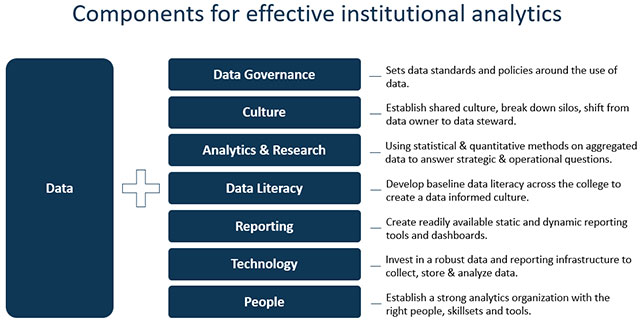Institutional Analytics: The Data Revolution in Higher Education
What are the components that an institution needs to have in place in order to effectively do this? You refer to them as competencies?
You … have to have these eight competencies.
-
Data [itself] would be considered one of the competencies.
-
You have to have data governance, which helps decide how you describe data. What does full-time student mean? Who has access to that data?
-
Culture. You [need] data stewards. What is the culture around the use of data, the analytics? It's an institution data, not my data, so we're gonna share.
-
The use of data, the analytics, it's the ability to [ensure] data scientists and others to be able to actually do the advanced analysis on the data.
-
Data literacy is being able to interpret the data and understand what it's telling you.
-
Reporting is the ability to get the information out of the data….
-
Technology is a very broad category, but that's your data repositories … and the reporting tools.
-
And then, of course, you need the people to be able to do all that.
And so as you are maturing your use of data, you need to be really focusing on these eight competencies.

Where do you think a lot of the institutions that you collaborate with or work with are at as far as those competencies go?
I think we are all over the map.
What we're going to talk about [in our session at Tech Tactics] is really a framework through which they can be thinking about their programs and the elements that are needed for success. How people actually develop each of those eight competency areas. It's a way to think about it and frame the conversation with the leadership at those institutions.
So that's really what our goal is, again, to allow people to take a, a step back and say, okay, you know, what do we need to advance this at our institution?
Can you talk about what some of the limitations are of this particular approach? I know every maturity model has different limitations.
I think, getting people to agree on how they are using the data and analytics. And also, [the model] doesn't go into the why as much. About why you would want to do strategic analytics or why you want to be in any particular quadrant. And again, it's not like, oh, we're trying to get everyone here. It's like you, I believe you need to have functions in all four quadrants in order to be successful. If you were just doing strategic analytics about how do we move forward, you wouldn't be able to know how many students are coming in the door or those other things. You need to be able to do the operational reporting: What are my account balances? What's my cash flow? So you need to be in each of the four quadrants. I think that's important.
You're also participating in a panel on AI in education. How is AI coming into play in this this specific area?
AI is just growing so rapidly and evolving incredibly rapidly. I think the AI can help us organize our information in ways that we were not as able to do so as easily. AI can look for connections between things that we may have missed using some other technology. I think the generative AI that a lot of the companies are starting to build into their tool set will empower people across the institution to have more direct access to data and information to ask questions and make decisions themselves.